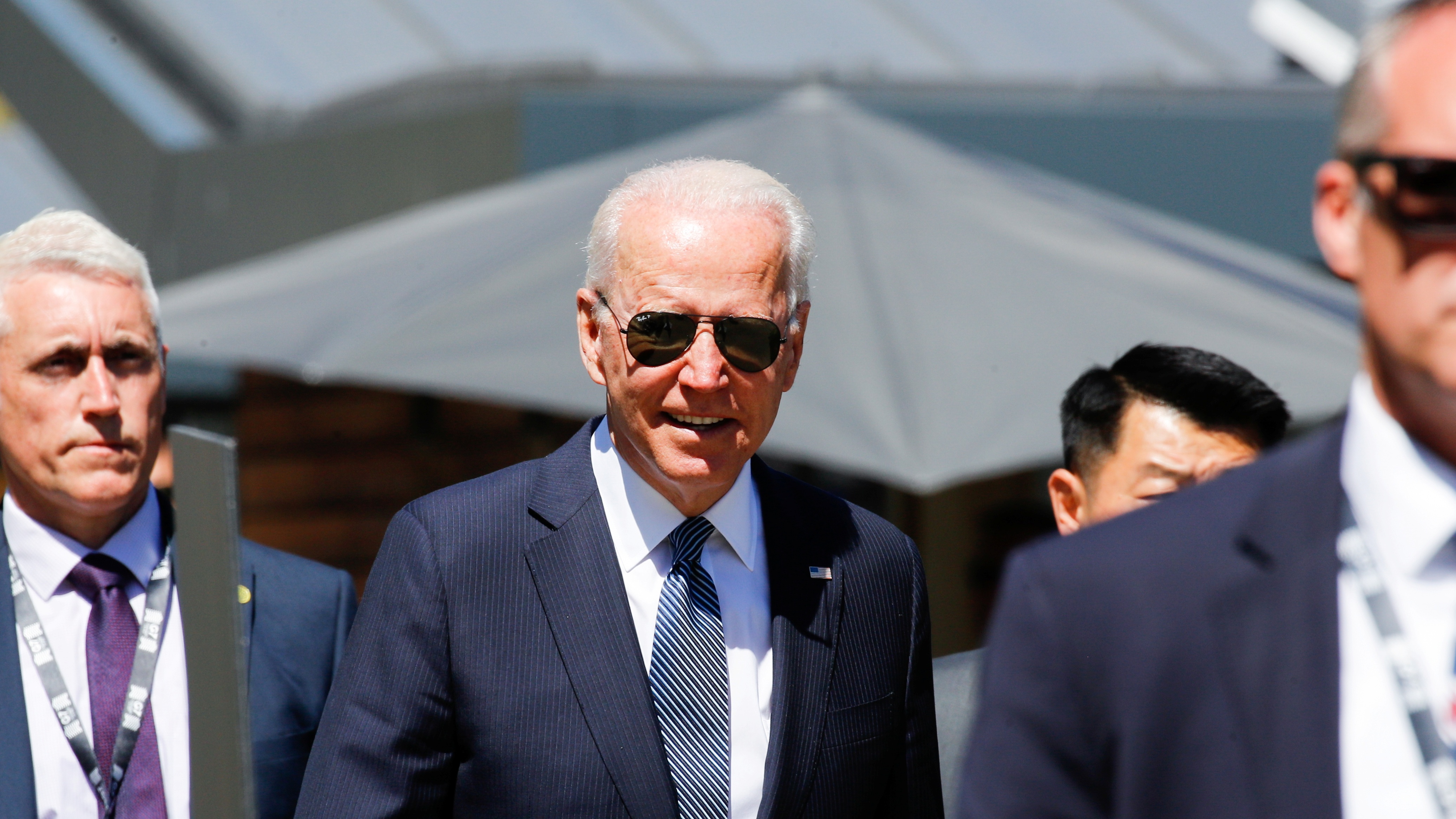Biden vs. Putin: the state of relations heading into the Geneva face-to-face
Tensions high as two leaders meet today for first time since US president took office

A free daily email with the biggest news stories of the day – and the best features from TheWeek.com
You are now subscribed
Your newsletter sign-up was successful
Joe Biden has described Vladimir Putin as a “bright” and “worthy adversary” in the run-up to their first in-person meeting - but warned that the US would “respond in kind” if the Russian leader doesn’t play ball.
Addressing press following a Nato summit in Brussels on Monday, the US president said that he would “make clear to President Putin that there are areas where we can cooperate if he chooses” at today’s talks in Geneva. But “if he chooses not to cooperate and acts in the way he has in the past relative to cybersecurity and some other activities then we will respond in kind”, Biden added.
Biden has used the Nato gathering to “gauge views from allies, including leaders of the Baltic nations and Poland, and said that everyone believed he was doing the right thing in sitting down with Putin”, The Times reports. Tensions between the US and Russian leaders remain high, however, after Biden labelled Putin “a killer” during an interview in March.
The Week
Escape your echo chamber. Get the facts behind the news, plus analysis from multiple perspectives.

Sign up for The Week's Free Newsletters
From our morning news briefing to a weekly Good News Newsletter, get the best of The Week delivered directly to your inbox.
From our morning news briefing to a weekly Good News Newsletter, get the best of The Week delivered directly to your inbox.
In a diplomatic tit-for-tat, Putin told NBC News last week that the relationship between their two nations had “deteriorated to its lowest point in recent years”.
Post-Cold War low
Asked by a journalist on Monday whether he stood by calling Putin a “killer”, Biden said “the answer is, I believe he has in the past, essentially, acknowledged that he was, or certain things, that he would do or did do. When I was asked that question on air, I answered it honestly. I don’t think it matters a whole lot in terms of the meeting we’re about to have.”
Questioned about the jailing of Alexei Navalny, Biden said that the potential “tragedy” of the opposition leader’s death “would be another indication that Russia has little or no intention of abiding by basic fundamental human rights” and “would do nothing but hurt relations with the rest of the world, and me”.
A free daily email with the biggest news stories of the day – and the best features from TheWeek.com
However, Biden “stressed that he would offer cooperation on areas of common interest” despite the “many disputes” between the Washington and Moscow, The Times reports. While agreeing that relations had reached a new post-Cold War low, the US president clearly “hopes to turn a corner with Putin”, the paper adds.
All the same, the signs are that the meeting “will not be a friendly encounter”, writes the BBC’s Moscow correspondent Sarah Rainsford.
The summit seems unlikely to “lead to a thaw in relations between Washington and Moscow”, agrees The Wall Street Journal, with both Biden and Putin signaling their intention to “project strength on the global stage”.
And even if Biden intends to extend an olive branch, Putin “has gone out of his way lately to underline his view of the West as hostile”, the BBC’s Rainsford adds.
At the Economic Forum in St Petersburg early this month, Putin claimed that the US wants to “contain” Russia’s development. He has also recently threatened to “knock out the teeth” of any foreign aggressor who “wants to bite us somewhere or to bite off something from us”.
This week’s “summit is important in terms of symbolism”, Andrei Kortunov, director of the Moscow-based Russian International Affairs Council (RIAC) think tank, told Rainsford. “It puts Russia in the same league as the US, and for Putin symbolism is not unimportant.”
Yet despite the Russian leader's heated rhetoric at home, “as a rational politician, Putin would like to reduce the costs and risks associated with this adversarial relationship”, Kortunov added.
On the agenda
Team Biden has made no secret of the fact that the president has engaged in “intense preparations ahead of his talks” with Putin, says CNN. According to insiders, Bidden “has held lengthy preparation sessions with senior officials”, including Secretary of State Antony Blinken and National Security Adviser Jake Sullivan, the broadcaster continues.
Biden also reportedly discussed Russia with German Chancellor Angela Merkel and the Queen during the G7 summit in Cornwall last week, as he geared up to tackle issues with Putin ranging “from cyberattacks to Syria to Ukraine”.
The Guardian’s Moscow correspondent Andrew Roth says that while the White House is under no illusions about a “Russian reset”, Biden believes there are some areas on with Moscow and Washington could normalise relations.
These areas include “arms control and possibly the climate emergency”, Roth writes, and the mood music in the Biden administration suggests that there are hopes of “re-establishing a routine strategic dialogue between US and Russian officials”.
What Putin “doesn't want, but is braced for, is a lecture on human rights”, with Biden also expected to raise the poisoning and jailing of Navalny, says the BBC’s Rainsford.
The opposition leader’s political offices and anti-corruption organisation “have just been banned as ‘extremist’ by a Moscow court, a ruling that could easily have been delayed until after the summit,” Rainsford reports. “Instead, the timing seems meant to send a message: that Putin will continue to crush dissent and that is none of America's business.”
During his NBC News interview last week, Putin made clear that he considers Biden to be very different from his predecessor, Donald Trump, describing the incumbent as “a career man”.
“He has spent virtually his entire adulthood in politics,” said Putin. “That’s a different kind of person, and it is my great hope that, yes, there are some advantages, some disadvantages, but there will not be any impulse-based movements on behalf of the sitting US president.”
As Putin and Biden come face to face in Geneva, The Guardian’s Roth fears that “other than avoiding a scandal, there appears to be little that Moscow and Washington can agree on”. Indeed, some analysts have predicted a stage-managed “snoozefest” in which “success from Moscow’s perspective” will be “judged on a modest scale”.
Political analyst Lilia Shevtsova told the BBC’s Rainsford that “Biden will do his song - his prelude about Navalny and human rights. Then Putin will do his song - that the US is the same.”
“But the fact this meeting is taking place means that after the human rights ‘hors d’oeuvre’, they'll move on to the main dish. And that is - let's do something to lower the tension,” Shevtsova added.
Joe Evans is the world news editor at TheWeek.co.uk. He joined the team in 2019 and held roles including deputy news editor and acting news editor before moving into his current position in early 2021. He is a regular panellist on The Week Unwrapped podcast, discussing politics and foreign affairs.
Before joining The Week, he worked as a freelance journalist covering the UK and Ireland for German newspapers and magazines. A series of features on Brexit and the Irish border got him nominated for the Hostwriter Prize in 2019. Prior to settling down in London, he lived and worked in Cambodia, where he ran communications for a non-governmental organisation and worked as a journalist covering Southeast Asia. He has a master’s degree in journalism from City, University of London, and before that studied English Literature at the University of Manchester.
-
 Political cartoons for February 15
Political cartoons for February 15Cartoons Sunday's political cartoons include political ventriloquism, Europe in the middle, and more
-
 The broken water companies failing England and Wales
The broken water companies failing England and WalesExplainer With rising bills, deteriorating river health and a lack of investment, regulators face an uphill battle to stabilise the industry
-
 A thrilling foodie city in northern Japan
A thrilling foodie city in northern JapanThe Week Recommends The food scene here is ‘unspoilt’ and ‘fun’
-
 How corrupt is the UK?
How corrupt is the UK?The Explainer Decline in standards ‘risks becoming a defining feature of our political culture’ as Britain falls to lowest ever score on global index
-
 The ‘mad king’: has Trump finally lost it?
The ‘mad king’: has Trump finally lost it?Talking Point Rambling speeches, wind turbine obsession, and an ‘unhinged’ letter to Norway’s prime minister have caused concern whether the rest of his term is ‘sustainable’
-
 Is the American era officially over?
Is the American era officially over?Talking Points Trump’s trade wars and Greenland push are alienating old allies
-
 Trump’s ‘Board of Peace’ comes into confounding focus
Trump’s ‘Board of Peace’ comes into confounding focusIn the Spotlight What began as a plan to redevelop the Gaza Strip is quickly emerging as a new lever of global power for a president intent on upending the standing world order
-
 Trump’s Greenland ambitions push NATO to the edge
Trump’s Greenland ambitions push NATO to the edgeTalking Points The military alliance is facing its worst-ever crisis
-
 Can Starmer continue to walk the Trump tightrope?
Can Starmer continue to walk the Trump tightrope?Today's Big Question PM condemns US tariff threat but is less confrontational than some European allies
-
 The high street: Britain’s next political battleground?
The high street: Britain’s next political battleground?In the Spotlight Mass closure of shops and influx of organised crime are fuelling voter anger, and offer an opening for Reform UK
-
 Trump considers giving Ukraine a security guarantee
Trump considers giving Ukraine a security guaranteeTalking Points Zelenskyy says it is a requirement for peace. Will Putin go along?